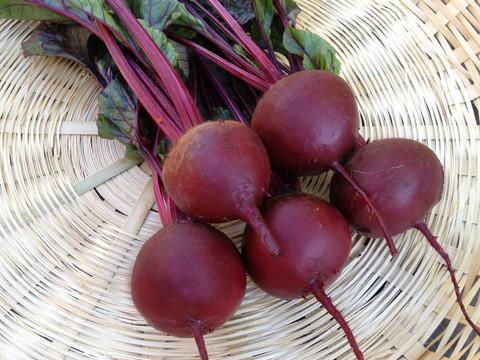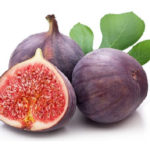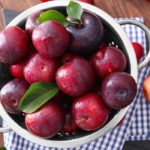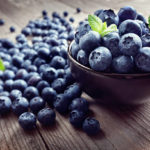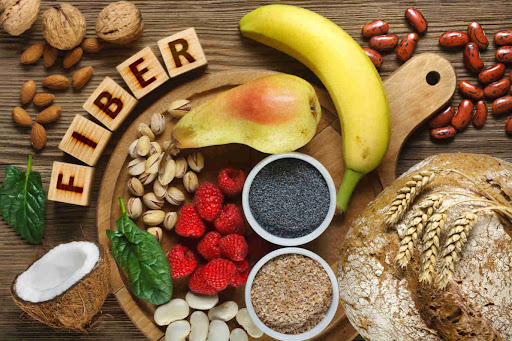RED BEETS AND ITS BENEFITS
One of the most important Red Beet benefits is that its red juice fight against anemia. The blood-red color makes it have a very nice note to potato and salad dishes. Sometime many people who had consumed the red beets assumed that the red beet could contain blood and this assumption comes after they must have passed blood-red urine or feces after consuming beets.
Accoridng to healthyeating, this is not blood but a pigment that seems specific to this very plant and it is known as betacyanin.
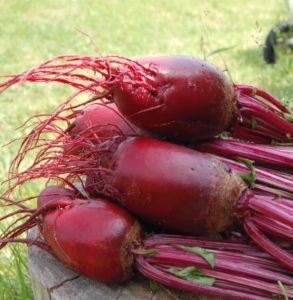
A study which was carried out at the University of Sheffield; it says that blood-red urine or feces after consuming red beets occurs in 11% to 15% of the population especially in individuals with deficiency of iron or trouble in intestinal absorption of iron.
In essence, when you see a blood-red urine or feces after eating the red beet, just know that it might be an indication that there’s lack of iron in your system or probable digestive problem in your system.
Red Beet is an herbaceous plant which belongs to the botanical family Chenopodiaceae with tuberous roots. The Red Beet is cultivated in all parts of Europe and North America and they do well with cold climates.
Composition of Red Beet
The information is based on per 100 grams of raw edible portion of the Red Beet as stated by Dr. George in his book “Encyclopedia of Foods and Their Healing Power”
Energy = 43.0 kcal = 179 kj
Fiber = 2.80 g
Protein = 1.61 g
Carbohydrates = 6.76 g
Vitamin A = 4.00 μgg RE
Vitamin B1 = 0.031 mg
Vitamin B2 = 0.040 mg
Vitamin B6 = 0.067 mg
Niacin = 0.651 mg NE
Folate = 109 μg
Vitamin C = 4.90 mg
Vitamin E = 0.300 mg ∝-TE
Vitamin B12 = Nil
Calcium = 16.0 mg
Magnesium = 23.0 mg
Phosphorus = 40.0 mg
Iron = 0.800 mg
Potassium = 325 mg
Zinc = 0.350 mg
Cholesterol = Nil
Saturated fat = 0.027 g
Total Fat = 0.170 g
Sodium = 78.0 mg
Red Beet has the following percentage composition
Fiber = 2.80%
Minerals = 1.08%
Carbohydrates = 6.76%
Fat = 0.170%
Protein = 1.61%
Water = 87.6%
SEE ALSO: Health Benefits of Blueberries
PROPERTIES AND INDICATIONS
In Red Beet’s composition, carbohydrates such as saccharose and fructose are quite noticeable, and contributes to their richness in sugar but only surpassed by other varieties of beets
- Red Beets are quite anti-anemic: Drinking 60 to 100 ml of raw, freshly beet juice before meal time two times a day is capable of providing the greatest anti-anemic effect. The anti-anemic of the Red Beet is well pronounced. The iron content and vitamin C help foster the absorption of minerals.
- Hypolipidemic: They contain a significant amount of vegetable fiber which helps facilitate the intestinal action and thereby decreasing blood cholesterol level. This is done by bring down the amounts absorbed in the intestine. For individual wishing to reduce cholesterol level should consider including it in their diet.
- Red Beets have a mild laxative effects due to the amount of fiber they contain
- Alkalizer: Beets are high in mineral salts levels particularly potassium, magnesium and calcium and this make them have the alkalizing effects on the blood. For those suffering with gout, it is highly recommended, and even those experiencing increase in uric acid levels.
- Another red beet benefits is that they are anticarcinogenic
YOU MAY LIKE: Soybean is good for health
Preparation and Use of Red Beets
-
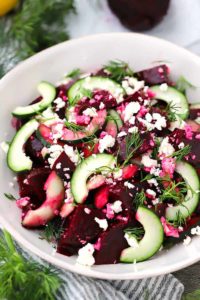
Beet Salad Grated raw: Red beets that are prepared like this will go well when combined or dressed with lemon oil.
- Boiled: To recommended time to get red beet boiled should be at least 1 hour. To peel them easily, dip them in a cold water while they are still hot. Boiled Red Beet are quite digestible.
- Fresh Juice: The fresh juice should be sweetened with honey or juices as the flavor of the red beet is somewhat unpleasant. To avoid indigestion, no more than 60 to 100 ml should be taken at a go.
NOTE: Sugar Beet is a variety of Beet and is very rich in sugars but recommended for direct consumption. The juice may contain up to 25% saccharose and this is the reason why it is cultivated for industrial production of white sugar
These are some of the impressive red beet benefits
- One of the benefits of red beets is that they help in keeping the blood pressure in check.
- Red beets also ensure that athletic performance are ensured.
- They also help fight against some inflammations
- With red beets, the digestive health is improved
- Red beets also give support to the health of the brain
- They seem be anticarcinogenic since they have some anti-cancer properties
- They also improve weight loss
Both the leaves and roots of the red beet are endowed with nutrients and some other antioxidants that help combat damage of cells and also bring down the risk of heart disease.
Betalains is an effective antioxidant contained in red beets which give them the red color. The presence of this antioxidant help fight against cancer, reduce inflammation and also protect against other diseases.
More on Red Beet Health Benefits
Red beets benefits are quite numerous for which they help in reducing inflammation with the help of the plant compounds they contain. They also help protect cells from damaging. The following are some other health benefits of red beets
Improves Stamina
Another health benefit of red beets or beetroot and its juice is that they help the lungs and the heart perform properly during activities such as exercising. They also help increase the flow of blood.
This is carried out by the presence of nitric oxide from the beet and this is one of the reasons those who are involved in recreational activities drink the juice or eat the beet to increase performance.
Help Fight against Stroke and Heart Disease
Red Beets benefits are seen in their richness in folate which also helps the cells grow and also help them function well. With Folate, it is easy to control damage to blood vessels and this plays a good role and reducing the risk of stroke and heart disease.
Red Beet Helps in lowering Blood Pressure
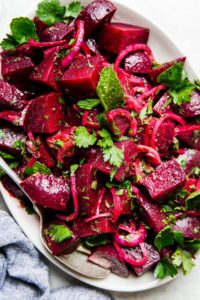
Red Beets are highly rich in nitrates, naturally, and in the body, they are turned into nitric oxide. With this compound, blood pressure is lowered thereby making the blood vessels to get widened and become relaxed.
They also help boost immune system
They foster the growth of bacteria in the gut region, which are beneficial to the body system because they are highly rich in fiber.
Presence of good bacteria in the digestive system is quite beneficial because they help fight disease and promote immune system. The fiber content also help in reducing the risk of constipation and also foster digestion.
ALSO SEE THESE BELOW

A graduate of Computer Science and Information Management Technology. Diploma – Caregiving, Certificates – Dementia and Diabetes Awareness and Management. A researcher, blogger, songwriter, singer and acoustic guitarist. Born in an environment where natural talents such as healing are imparted at our natural birth. This natural talents of healing is the result of our genetic inheritance and the training from family environment.

